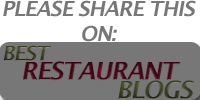A few years ago I had the opportunity to work with a very talented and passionate pantry cook named Nicolette. She left not long after I started to attend culinary school. I advised against it. She has since graduated from the Culinary Institute of America and become an accomplished pastry chef. I asked her to answer a few questions about school and what she gained from the experience as what I hope is a prelude to future posts.
What made you decide to be a pastry chef?
I wanted to be a pastry chef for as long as I knew what a pastry chef does. I baked with my mother as a child and I attribute a lot of my success to her encouragement. I remember when I told her that I was going to culinary school in New York and without her support, I would not have been able to accomplish what I have.
How long had you been in the business before you decided?
About four years. A chef that I worked with previous to attending the Culinary encouraged me to apply and I began my online application that night after work.
What made you choose CIA?
They like to call it “the world’s premier culinary college” and they are not lying. CIA is all about perfection and because the program is progressive with the assumption of zero experience, they ingrain the highest standards in students. It is a safety net for learning and making mistakes. If you overcook vanilla sauce and end up with a pot of scrambled eggs, you paid for it. It is the ideal place for learning in that sense, not that anyone wants to make scrambled eggs.
What do you think helped you get into CIA?
Academically, I have always been successful and I attribute much of that success to having had the privilege of attending private school. My experience in the industry and recommendations also secured my acceptance. The more experience you have, along with humility, the more you take from the experience. Not to mention, student loan lenders.
Describe the program at CIA?
There are two programs, culinary and baking/pastry. Most courses last between twelve and fourteen days. It is a progressive approach so everything you learn in a previous class is reinforced and applied in subsequent classes. For example, that vanilla sauce we made earlier becomes the base for a mousse. You are expected to know certain techniques without instruction if they were previously taught. Repetition is very important.
What did you think was the most valuable part of the experience?
The experience gave me confidence in the industry and a solid foundation. I feel like I can make anything knowing what I learned at CIA.
What do you wish someone would have warned you about?
Shoes. My birkenstocks have seen better days and are a bit stretched out. A chef at CIA commented that I should scoff less when I walk and something about not wanting to hire someone who is too lazy to pick up their feet when they walk. I had to double up on socks for two weeks until the class was over and hold my tongue about the part where I am paying him, not the other way around. Constructive criticism, as they say, is alright. Someone embarrassing you in front of a group of people because you walk to keep your too big shoes on your feet is another story.
Did you get to meet any famous alums or guest speakers?
Anthony Bourdain filmed an episode of No Reservations while I was attending CIA and Emeril Lagasse was a guest speaker for the graduation preceding mine. I made Emeril breakfast while he was there, but did not meet him.. not too disappointed. Also, the grits I made for him popped on my arm and the scar is still visible. BAM!? All his fault. Thomas Keller was around for about a week while the Bocuse d’Or USA Competition was going on. If I were a celebrity chef junky, I would probably be able to name about ten more.
If you had it to do over again, would you still go through the program?
Absolutely. My education got me the job I have now, along with my speed, knife skills, and lovely disposition.
What is your goal in the industry?
I would love to own my own pastry shop. I love baking french macaroons above all else. If I could make a living from almonds, powdered sugar, and eggs whites, I would be very happy.
Have a great cooking tip for our readers?
Repetition. Following the formula and not following the formula? Practice. You overcook the vanilla sauce once. Only once.
What would surprise most people outside the business about what goes on in kitchens?
Conversations, practical jokes, sexual harassment. Especially being a woman in the kitchen, you have to have a very thick skin.
What annoying question do you get from people when they find out you are a chef?
Whether or not I want to be on television, to which the answer is most definitely not. I have no aspiration to make a spectacle of myself.
(If anyone has a question for Chef Nicolette, leave it in the comment section below. I am sure she would be happy to answer or use it as inspiration for a future post.)




Where are you going to settle with your wonderful skills? Are you coming back to Kansas City or will it be some exotic locale? Since you learn something new every day, what will you focus on? When you say you want your own place, does that mean a small local eatery or a larger place where you oversee other pastry chefs?
I am currently living and working in upstate New York. I am the Pastry Chef for an independent fine dining restaurant. I would love to open a small patisserie in Kansas City in the not too distant future. I definitely need a couple more years of experience in the industry before I partake in such an endeavor. I would like to focus on french macaroons because they are so rarely found in bakeries, especially in the midwest. I think they would go over well and become a novelty. There is also the possibility of cakes, for special occasions and weddings. To work for myself is the ultimate goal.